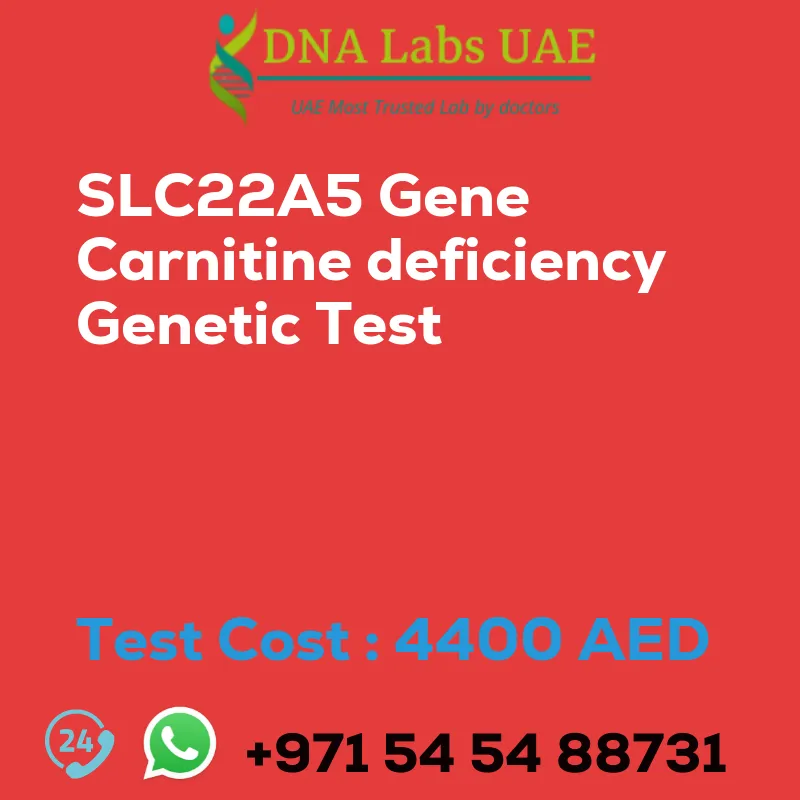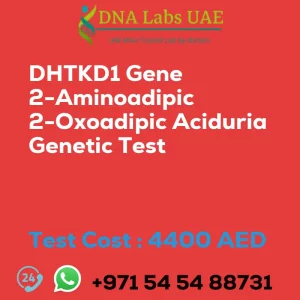SLC22A5 Gene Carnitine Deficiency Genetic Test
At DNA Labs UAE, we offer the SLC22A5 Gene Carnitine Deficiency Genetic Test to diagnose and identify potential mutations or variations in the DNA sequence related to primary carnitine deficiency (PCD).
Test Components and Price
The test is priced at 4400.0 AED.
Sample Condition
We require a blood sample or extracted DNA for the test. Alternatively, one drop of blood on an FTA card is also acceptable.
Report Delivery
The test results will be delivered within 3 to 4 weeks.
Method
We use NGS (Next-Generation Sequencing) technology to perform the genetic test.
Test Type
The SLC22A5 Gene Carnitine Deficiency Genetic Test falls under the category of Metabolic Disorders.
Doctor
The test can be ordered by a General Physician.
Test Department
The test is conducted by our Genetics department.
Pre Test Information
Before undergoing the SLC22A5 Gene Carnitine Deficiency Genetic Test, it is important to provide the clinical history of the patient. Additionally, a Genetic Counselling session is recommended to draw a pedigree chart of family members affected by Carnitine deficiency.
Test Details
The SLC22A5 gene encodes a protein called organic cation transporter type 2 (OCTN2), which is responsible for transporting carnitine across cell membranes. Carnitine is essential for the transport of long-chain fatty acids into the mitochondria, where they are metabolized for energy production.
Mutations in the SLC22A5 gene can lead to primary carnitine deficiency (PCD), a condition characterized by a reduced ability to transport carnitine into cells. This results in low levels of carnitine in the body and impairs the breakdown of fatty acids for energy production.
Common symptoms of carnitine deficiency include muscle weakness, low blood sugar, and an enlarged liver.
Our NGS genetic testing method allows us to analyze multiple genes simultaneously, making it ideal for identifying mutations in the SLC22A5 gene associated with PCD.
By identifying specific mutations in the SLC22A5 gene, our genetic test provides a definitive diagnosis for carnitine deficiency. This information is crucial for guiding treatment decisions, such as carnitine supplementation, and for providing genetic counseling to affected individuals and their families.
| Test Name | SLC22A5 Gene Carnitine deficiency Genetic Test |
|---|---|
| Components | |
| Price | 4400.0 AED |
| Sample Condition | Blood or Extracted DNA or One drop Blood on FTA Card |
| Report Delivery | 3 to 4 Weeks |
| Method | NGS Technology |
| Test type | Metabolic Disorders |
| Doctor | General Physician |
| Test Department: | Genetics |
| Pre Test Information | Clinical History of Patient who is going for SLC22A5 Gene Carnitine deficiency NGS Genetic DNA Test A Genetic Counselling session to draw a pedigree chart of family members affected with Carnitine deficiency |
| Test Details |
The SLC22A5 gene is responsible for encoding a protein called organic cation transporter type 2 (OCTN2), which is involved in the transport of carnitine across cell membranes. Carnitine is an essential molecule for the transport of long-chain fatty acids into the mitochondria, where they are metabolized for energy production. Mutations in the SLC22A5 gene can lead to a condition called primary carnitine deficiency (PCD). PCD is characterized by a reduced ability to transport carnitine into cells, resulting in low levels of carnitine in the body. This can impair the breakdown of fatty acids for energy production, leading to symptoms such as muscle weakness, low blood sugar, and an enlarged liver. NGS (Next-Generation Sequencing) genetic testing is a method used to analyze multiple genes simultaneously to identify potential mutations or variations in the DNA sequence. In the context of carnitine deficiency, NGS genetic testing can be used to identify mutations in the SLC22A5 gene that may be responsible for PCD. By identifying specific mutations in the SLC22A5 gene, NGS genetic testing can provide a definitive diagnosis for carnitine deficiency. This information can be crucial for guiding treatment decisions, such as carnitine supplementation, and for providing genetic counseling to affected individuals and their families. |








